|
|
|
|
|
|
|
|
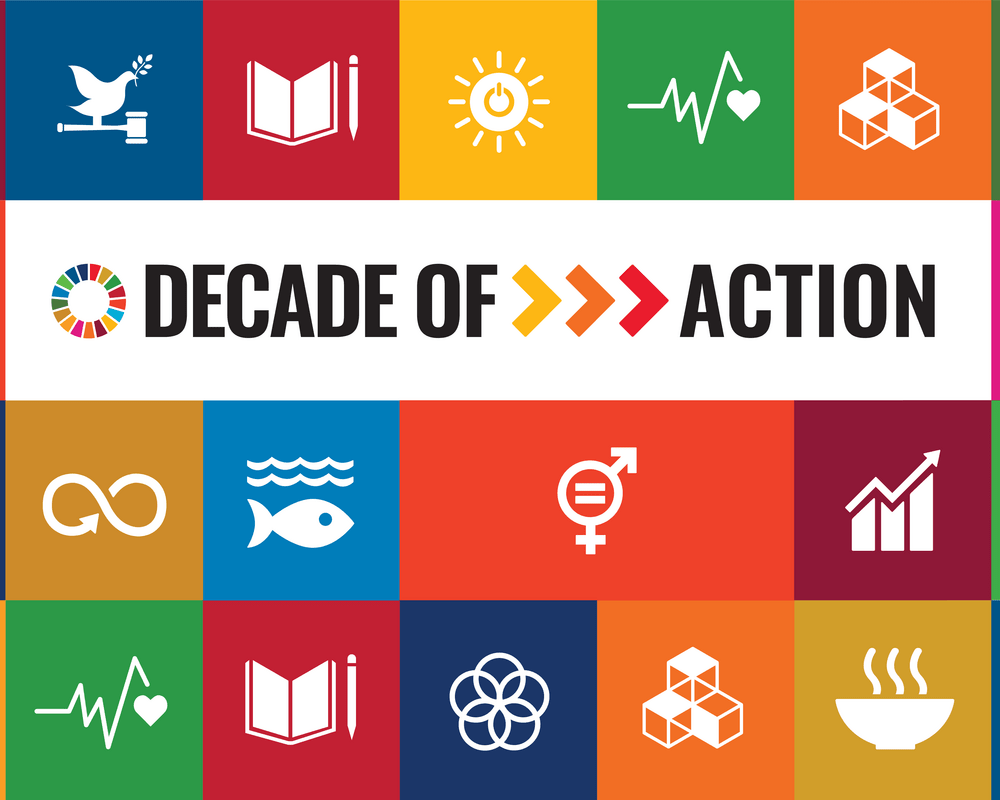
|
|
Contents
|
1. Message from the President
|
|
4. Conference Announcements
|
|
5.1 PXL, University of Applied Sciences and Arts - First HEI in Belgium with a UN label SDG Pioneer
|
|
5.2 Circularity Africa Conference Held in Nigeria
|
5.3 Azores - Insular Region with 60% Renewable Energy by 2025
|
|
1. Message from the President
|
|
|
|
Next to me on my desk lies one of these weekly magazines with a global presence. “Visions of Equity” is the cover title of the TIME Magazine Europe double issue of May 24/May 31, 2021. One challenge of TIME has been, the editorial team notes, that while “telling stories about the need for diversity and inclusion”, they also needed to work for “centering the voices of our own staff in that work.” They utilize the diversity of their staff to give us many inspirational examples from all over the world of “The Equity Agenda”, which they have named their 34 pages long
|
|
|
|
coverage of racial inequality, police violence and supportive movements for justice from all continents (with the diverse parliament in New Zealand as one great example of diversity), and a thought-provoking text with the title “The power of vulnerability” by the editorial director of newsroom development, Naina Bajekal.
|
Not only is it an important area of Agenda 2030 to work for a worldwide diversity and inclusion. I am also inspired by the words of the TIME editors of this double issue when turning the focus to themselves. In our context, it could be something like: What are important voices of the ISDRS community, current and future? And even more focused: How do we encourage and listen to voices of our board members in times when many of us are overrun with impressions during the pandemic, overload of work to comply with teaching and research during the pandemic and planning for how to work and live in a post-pandemic era (whenever the time is ripe for that)? Not only is it important of what ISDRS and our community can provide to the world, but is equally important to see how the most engaged scholars in our community (as for instance track chairs, board members, executives, and not the least our new duo of leaders in the New Professionals Group) can be further supported and enrolled in good and sound talks about the way we go about in and around ISDRS. This is something I will also dedicate my time to in the future.
|
While the newsletter certainly has a greeting from the conference chair of ISDRS 2021, I am very excited to know that we may be 350+ scholars coming together during July 12-15 with first a PhD day and then the three main conference days. We are testing a new abstract management system and conference system of Oxford Abstracts, cutting the costs dramatically and by that, lowering the conference fees radically. We hope to allow for a higher number of delegates, and a more diverse conference participation by low costs of this years online event.
|
Looking forward to seeing you at ISDRS 2021! “Vi ses!”
|
|

|
|
2. Announcements
|
|
|
ISDRS 2021 Conference update
|

|
Mid Sweden University will host the 27th ISDRS virtual research conference. Conference special topic: Accelerating the progress towards the 2030 SDGs in times of crisis. The conference will bring together more than 500 researchers in the field of sustainable development. The conference has accepted after a double-blind peer review process 400 presentations under 10 special themes with a total of 32 tracks. Read more about tracks and themes.
|
The virtual conference starts with online PhD workshops on July 12, 2021 and online conference on July 13-15 2021 to which 60 presenters have been accepted out of 117 expressions of interests. Besides the work of presenters with Peers, additional program will be organised together with ISDRS’s New Professional Group. Read more about the PhD workshop. https://2021.isdrsconferences.org/phd-workshop/
|
|
Keynote speakers and plenary who accepted our invitation are Elisabeth M. Mrema, Joji Carino, Hien Ngo, Hans Bruyninckx, Ranjula Bali Swain, Jeffrey D. Sachs, Jane Kabuba-Mariara, Marie-Claire Cordonier Segger, Marcos Regis da Silva, Joji Carino, Mark Elder and Åsa Persson.
|
|
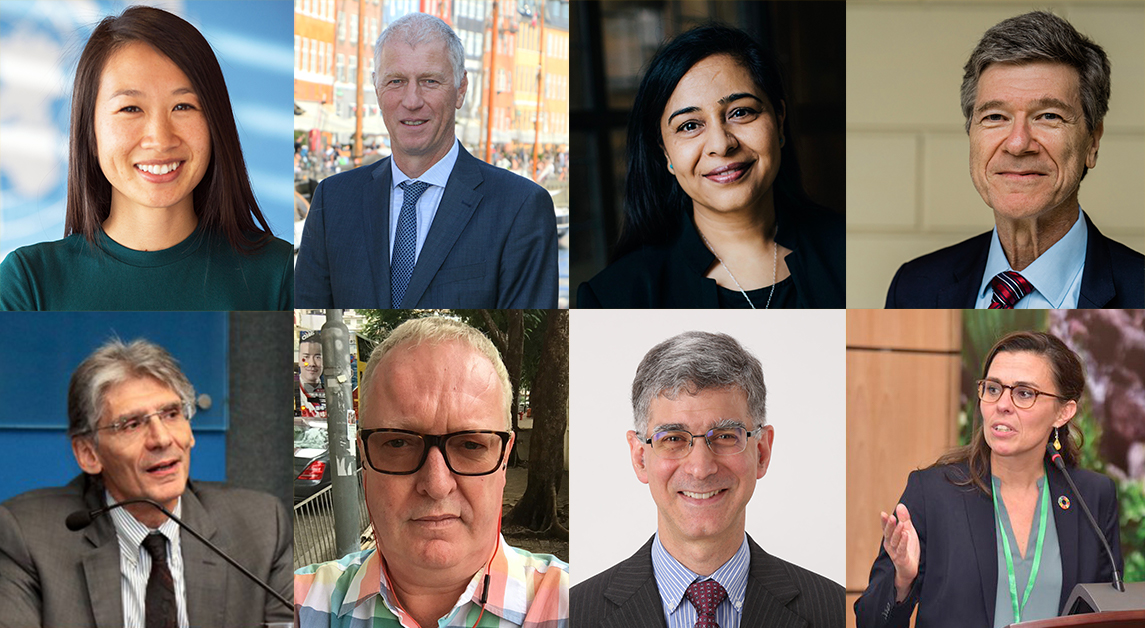
|
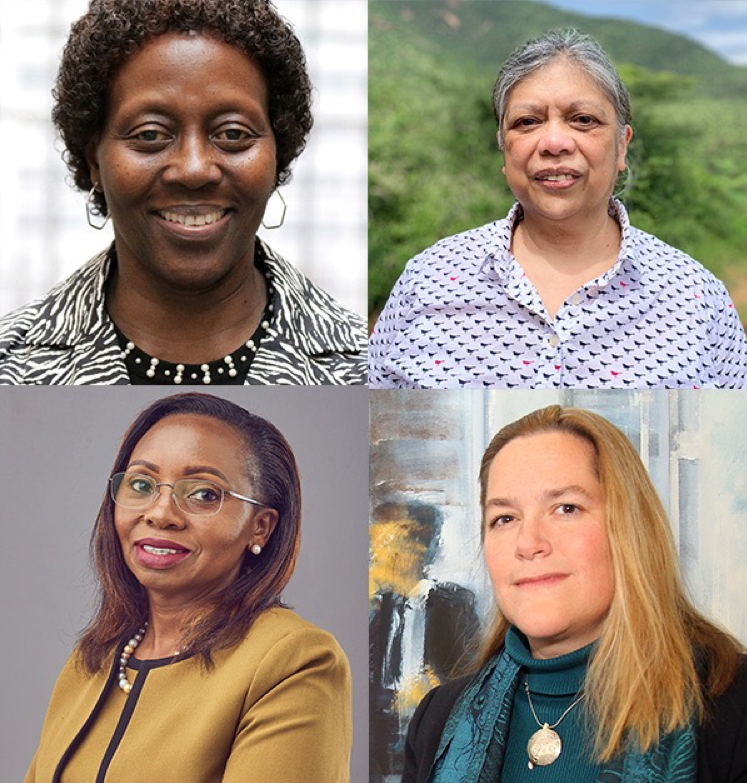
|
|
Registration for the conference is still open for one day tickets until 14th July 2021. To register on the website, click 'register' below.
|
|
|
|
|
|
|
|
Welcoming New Partner Organisation
|
|
|
|
ISDRS is happy to welcome a new partner organisation - League of Professional Women (LPW), Ukraine. The LPW was established 1997 for the common goal of expanding the social and economic opportunities of women in Ukraine.
|
|
|
|
|
Our mission is promoting the active role of women in the economic and society's life of Ukraine, through learning and professional development; advocacy and networking; informational and cultural support (http://www.lpw.org.ua).
|
|
For more information on how to be a partner organisation, please contact the Secretary via secretary@isdrs.org.
|
|
|
|
|
|
ISDRS New Professionals Group
|
|
1 July 2021, 02:00-03.30pm CEST
|
|
Internal event on career paths, EU funding and collaborations - Brigitta Jaksa, Södertörn University, Stockholm, Sweden
|
Research Advisor and International coordinator of EU research funding, development & innovation projects, collaborative education/teaching projects, network building, strategic internationalization
|
|
14 July 2021, 05:30-06:30pm CEST
|
|
The 27th annual ISDRS Conference
|
|
NPG Mentorship Programme Mingle – Mentees and Mentors of the programme will meet in an unformal setting to network and discuss career paths and challenges and opportunities with mentorships. There will be time for potential applicants to next year’s programme to join and ask questions at 06:00pm CEST.
|
|
|
|
Job, PhD and Masters opportunities
|
|
|
Sustainable Chemistry and Technologies for Circular Economy
|
At Padova University the new high education course to train professionals in green transition
|
|
As of October 2021, the University of Padova will be offering a new master’s degree programme in Sustainable Chemistry and Technologies for Circular Economy.
|
|
The two-year programme intends to provide students with interdisciplinary knowledge, skills and competencies so that they can make independent decisions within a sustainable context based on circular economy principles. The new master’s degree involves teaching from 12 different departments of Padova University and is taught entirely in English.
|
|
To address the new challenges of a climate-neutral Europe, upon completion of the first year, which is common to all students, it is possible to choose between two different paths, namely Resources and product design and recycling and Energy conversion and storage.
|
|
The programme has a strong intersectoral approach focusing on materials, both natural and synthetic, from a structural, compositional and functional point of view, taking into account aspects such as recycling of plastics, polymers and inorganic materials as metals and glasses, and issues associated with energy, as electrochemistry, biomass energy and management of energy process according to the circular model. Students will also gain knowledge of the green chemistry techniques and related industrial processes, as well as of thermodynamic and catalytic processes and their application to environmental protection and a circular production system.
|
|
During the Master’s Degree programme the traineeship experience ensures students have the chance to come into contact with productive activities and apply their knowledge within a real industrial and research context. To further disseminate the principles of circular economy, every year the programme will organize a summer school, which will involve external experts and will be open to company staff.
|
|
Considering the ever increasing request for professionals operating within the circular economy sector, graduates of the programme may be employed by companies, public administrations, or work as self-employed professionals. Employment opportunities include Circular Economy manager, Research and Development manager, external consultant for small- and medium-sized companies that wish to implement a circular model.
|
|

|
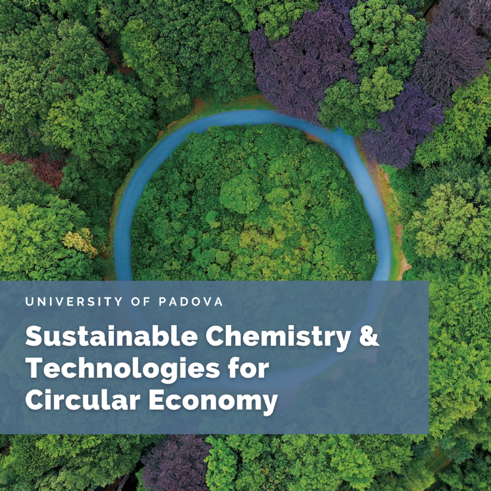
|
|
|
Book published: “The Role of Law in Governing Sustainability“
|
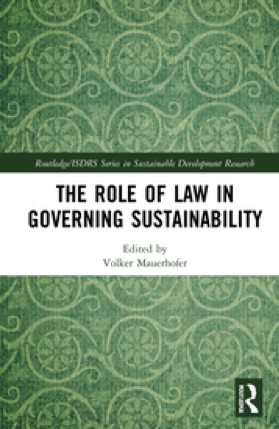
|
|
This book explores how public and private actors can interrelate to achieve also by means of law a sustainable development which is beneficial for the environment, society and the economy.
|
The Role of Law in Governing Sustainability assesses the structure, functions and perspectives of law in the wider governance frameworks of sustainable development. It provides latest and in-depth insights from each of the three dimensions of sustainable development and the relations among them. Latest political developments on global and regional level related to the environmental, social and the economic dimensions are provided as well as in-depth case studies. Thereby the book explores how international and national laws and governance can help us move towards a more sustainable future.
|
|
This book will be of great interest to students and scholars of environmental law, global governance and sustainable development.
|
|
Volker Mauerhofer is Professor and Chair, Environmental Science (Specialization in Social Science), Department of Ecotechnology and Sustainable Building Engineering, Mid Sweden University, Sweden.
|
|
|
|
Book published: “Handbook of the Circular Economy”
|
Edited by Miguel Brandão, David Lazarevic and Göran Finnveden
|
|
This crucial Handbook brings together the latest thinking on the circular economy, an area that has increasingly caught global attention. Contributors explore a broad range of themes such as recycling systems and new business models, as well as consolidating the many ways in which the topic has been dealt with in research, business and policy-making. The Handbook of the Circular Economy is not only relevant, but also essential for students, academics, and policy-makers trying to make sense of the plethora of ways in which the term has been applied and interpreted.
|
|
|
|
Upcoming Book
The hidden potentials of Tiny Houses
|
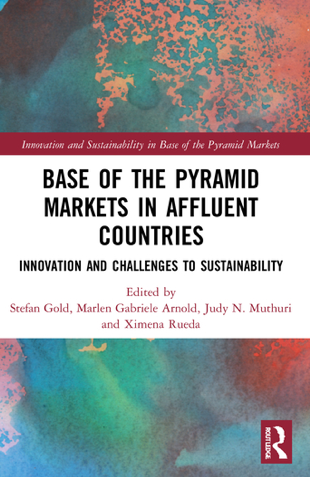
|
|
The chapter demonstrates the relevance of Tiny Houses in the context of sustainable development and their adaptability as Bottom of the Pyramid innovations. About 8% of the world's population lives in severe poverty, earning less than $2 a day (World Data Lab, 2018). If the capacity to produce global income and wealth distribution is calculated in terms of an economic pyramid (Prahalad, 2005), this group of people can be placed at the bottom (BoP). So, the term BoP mostly applies to very poor countries. Rich and poor are not only an issue between countries, but also within particular, especially wealthy countries (Finkenwirth & Diemand, 2017). Poverty is a complex concept facing multidimensional factors, e.g. social exclusion, and relative indicators as well. According to Rudnicka (2018) significant material deprivation, the risk of poverty, and low labour force participation can lead to poverty and social exclusion. Although Germany is one of the world's wealthiest nations having a far-reaching social system, in 2017, nearly 20% of people were affected by social exclusion or poverty (Statista, 2020).
|
|
In addition, Germany has been experiencing an increasing housing shortage, especially in large cities. Moreover, the lack of accessible social housing is leading to an increasing number of homeless people, social inequalities and poverty. The Sustainable Development Goals 1, 10 and 11 particularly address an improvement in the housing situation. Tiny Houses have the potential to reduce inequalities by offering shelter to homeless people, providing an affordable alternative for people with low incomes, or reintegrating people into society. There is a lack of scientific debate on sustainability impacts and the reduction of inequalities. The study examines the extent to which Tiny Houses may serve as Bottom of the Pyramid Innovations for the German market and whether they can help to reduce inequalities. Deductively derived principles for innovations in these markets were analysed by conducting expert interviews with relevant Tiny Houses stakeholders (an association, an NGO, a manufacturer, and a blogger) in August 2019. Based on this, potentials and challenges have been derived and analysed within the scope of social, ecological and economic sustainability priorities using content analysis. The results of the study point to a transferability of the underlying form of housing to the BoP principles and illustrate possible applicability. In a specific context, Tiny Houses can operate as innovation for BoP markets. The possibility of reintegrating people into society through Tiny Houses is highlighted. The location of the houses is especially important, because it is both one of the most important access criteria for users and a major barrier to integrating this type of housing nationally, both for average users and for those who are socially disadvantaged.
|
|
Finkenwirth, A, & Diemand, S (March 2, 2017). Armutsbericht 2017. Wie arm sind die Deutschen?. Retrieved April 30, 2020, from https://www.zeit.de/wirtschaft/2017-03/armutsbericht-2017-deutschland-paritaetischer-wohlfahrtsverband-faq.
|
|
Prahalad, CK (2005). The Fortune at the Bottom of the Pyramid: Eradicating Poverty through Profits. New Delhi: Pearson Education/Wharton School Publishing.
|
|
Rudnicka J. (November 6, 2018). Von Armut oder sozialer Ausgrenzung betroffene Bevölkerung in Deutschland 2017, Retrieved April 23, 2020, from https://de.statista.com/statistik/daten/studie/244865/umfrage/von-armut-oder-sozialer-ausgrenzung-betroffene-bevoelkerung-in-deutschland/.
|
|
Statista, Statista Research Department (2020). Statistiken zur Armut in Deutschland. Retrieved April 30, 2020, from https://de.statista.com/themen/120/armut-in-deutschland/.
|
|
World Data Lab (2018, October). World Poverty Clock. Retrieved October 25, 2019, from https://worldpoverty.io/.
|
|
|
|
Paper published
Feeding a growing population without deforestation: agroforestry system partnerships and mechanisms
The study aims to analyze the agroforestry system and its eco-efficiency, mainly from regulatory mechanisms and partnerships. We chose the stakeholder theory lenses to analyze the complex scenario of the relationship among different social actors. The contexts of Brazilian and Bulgaria agroforestry systems have been selected for our case study research. Twenty-four agroforestry experts/farmers working across 24 organizations and operating in Brazil and Bulgaria have been interviewed through semi-structured interviews. As a result, a comprehensive framework was created, which illustrates the key findings from the research divided into five directions: (i) key social actors in the agroforestry system, (ii) types of partnerships and cooperation between social actors; (iii) regulatory mechanisms for the agroforestry system, (iv) challenges of working with the agroforestry system, and (v) recommendations for future agroforestry entrepreneurs. Our comprehensive framework and findings will further support agroforestry farmers and policymakers.
|
|
Macke, J., Bozhikin, I. & Sarate, J.A.R. Feeding a growing population without deforestation: agroforestry system partnerships and mechanisms. Agroforest Syst 95, 687–706 (2021). https://doi.org/10.1007/s10457-021-00621-x
|
|

|
3. Call for papers
|
|
3.1 Special Issue "Enhancing Sustainability through Organizational Purpose"
|
Deadline for manuscript submissions: 28 February 2022.
|
|
|
|
|
|
|
|
Industrial Management Department, University of Navarra, TECNUN, 20018 San Sebastian, Spain
Interests: continuous improvement; organizational purpose; sustainability; strategic human resource management
|
Special Issue Information
|
|
In recent years, the effect of intangibles on the total value of an organization has increased considerably, climbing to more than 50%. Citizens increasingly demand more sustainable organizations that are able to offer solutions that have a positive impact on society and the environment in which they operate. Responding to these calls is crucial for organizations to instill confidence in and establish legitimacy for their operations. To this end, new organizational models should be sought that incorporate the three dimensions of sustainability (economic, social, and environmental) into their day-to-day operations.
|
|
It seems that one of the most effective organizational aspects to drive this paradigm shift is having an organizational culture that gives meaning to and strengthens the sense of sustainability the daily work of companies. The role of managers, strategy, management systems, organizational policies, workers themselves, and the interrelationship between them are key variables to enhance the sense of purpose and create a culture of sustainability in the company.
|
|
However, there is a lack of academic research on which to base the change toward organizational sustainability. In this Special Issue, we seek papers that work on improving some or all of the dimensions of sustainability from the point of view of organizational culture.
|
Dr. Marta Ormazabal
Dr. Álvaro Lleó
Guest Editors
|
|
|
|
First Brazilian Symposium on Sustainable Design (SBDS) and the International Symposium on Sustainable Design (ISSD)
|
|
The call for papers for the SDS2021 (VIII Simpósio de Design Sustentável + Sustainable Design Symposium) (www.sds2021.ufpr.br ) is open until 28th June. On this edition the event is organized by the Design & Sustainability Research Center of UFPR (Paraná Federal University). The event is free of charge, entirely remote and will occur between 1 and 3 December 2021. Whilst the first two days of the event are held in Portuguese, the last day (3rd December) will be organized fully in English, thus allowing the enrollment of an international audience. Link for submissions on the EasyChair platform: https://easychair.org/conferences/?conf=sds20210
|
|
The event is endorsed by the Brazilian chapter of the Learning Network on Sustainability (LeNS Brazil) and (thank you!) by the DESIS Network (Design for Social Innovation and Sustainability Network). During the three days of the event, we will have a wide range of activities aimed at promoting the sharing and debate of ideas and practices, including round tables, mini-courses, technical sessions, lectures, virtual exhibitions and book launch.
|
|

|
4. Conference announcements
|
|
|
Circular Economy: Sustainability implications of a social transformation
This conference aims to open discussion into the implications for sustainability of the development of a circular economy. A major element of resource policy globally, a circular economy is seen as reducing carbon emissions, protecting resource security, creating jobs and promoting the UN Sustainable Development Goals. However, the idea that the interests and outcomes of circularity coincide with those of sustainability is largely an untested assumption. This event presents and debates the findings of the EU-funded Cresting project examining the implications of circular economy with the aim of guiding progress towards a sustainable future.
|
|
Themes to be discussed include:
|
|
Company engagement with circular economy practices and methods for improvement
|
|
Potential for places to benefit from a circular economy
|
|
Strategies for public sector practice of a circular economy
|
|
Assessing the sustainability of circular practices
|
Transformative policy for a circular economy
|
|
Presentations of the key themes emerging from the Cresting project are followed by discussion led by international panels of circular economy experts.
|
|
Partnered with the Royal Geographical Society (with IBG)
|
|
This will be a hybrid event: attendance is free online; there is a £25 fee for attendance at the RGS-IBG in London, UK.
|
|
Click on the image below for more information.
|
|
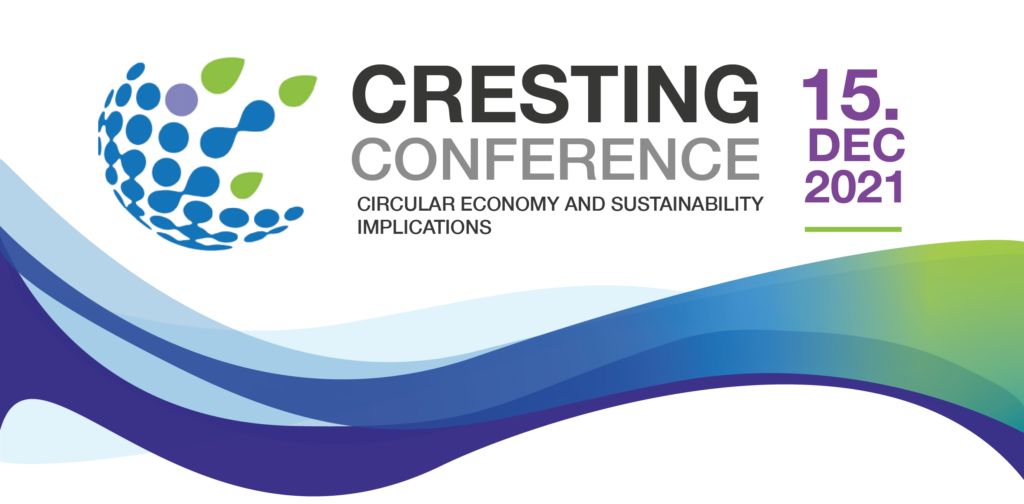
|

|
5. Sustainability news
|
|
|
5.1 PXL, University of Applied Sciences and Arts - First HEI in Belgium with a UN label SDG Pioneer
|
PXL, University of Applied Sciences and Arts, is the first educational institution in Belgium to successfully complete the process towards SDG Pioneership/CSR label of Voka - Chamber of Commerce Limburg.
|
|
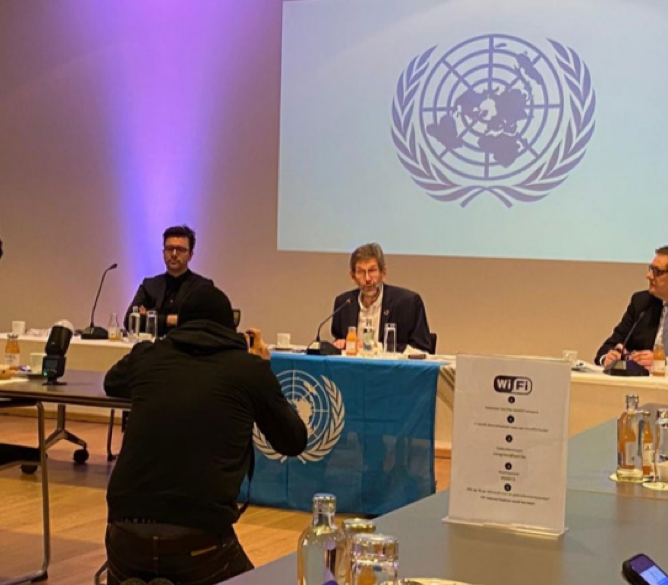
|
Prof. dr. D. Franco, central administration PXL, University of Applied Sciences and Arts, Elfde liniestraat 24 Hasselt (3500) Belgium
|
|
PXL is a young university, which originated from two ancestors with a great history. In 2013, a policy plan, mission and vision, which can be visualised by the X factor, were written based on the best of both worlds. This includes empassion (passion and empathy), internationalization, entrepreneurship and innovation, combined with professionality and multi disciplinarity. Naturally, this X factor also made it possible (entrepreneurial) to incorporate sustainability (top down and bottom up). The essence is an alignment of this X factor with the objectives of Agenda 2030 and integration of sustainability in our policy and strategy. A climate committee was set up in May 2019, that renamed itself as SDG@PXL.
|
|
This transition group quickly expanded itself to more than thirty employees and students (our junior colleagues) and became a “coalition of the willing.” This team is the pivotal point in the bottom up and top down realisation of a new policy plan in which sustainability is included in the mission and vision and has been elaborated in the policy lines of education, research, personnel and operational management.
|
We worked with both Voka and CIFAL Flanders to achieve this.
|
Besides SDG 4, PXL also focuses on SDGs (3, 8, 9, 11, 12, 13, 15). These are rolled out in all our activities, and involve more than 1000 staff members and 10,000 students. Visitors of the Life Long Learning Center (100,000/y) will also be made aware of this.
|
The outcome of PXL’s SDG Pioneer trajectory with CIFAL Flanders:
The necessary capacity was built to implement the SDGs and to conduct an impact assessment to identify priority areas. At the organisational level, PXL set up an SDG taskforce and guaranteed sufficient resources to effectively implement the SDG action plan. Sustainability competences are integrated in the learning programmes and a Green Office will be set up for students.
|
At the strategic level, PXL set up an SDG action plan with SMART objectives and an extensive communication plan. Integrating the SDGs leads toward solutions that simultaneously support social well-being, economic prosperity and peace.
|
|
The Multiple Level Perspective method is often cited to describe transition. We can see the university as the macro level, and the individual staff members as the micro level. However, we can of course also see the institution as a micro level in the (EU)regionial society. Being the first HEI in Belgium with the SDG Pioneer label, we hope to be a catalyst towards convincing more SDGs in (higher) education to have a multiplier effect towards our suppliers. With PXL serving as a role model, CIFAL Flanders is in consultation with other HEI to start a similar trajectory and partnership to become SDG-proof.
|
|
This generation is confronted with the effect of climate change and feels obligated to act. Therefore, we (PXL, CIFAL and Voka) offer them the tools and insights needed to create opportunities in their private and future professional lifes.
|
|
|
|
|
|
|
|
5.2 Circularity Africa Conference Held in Nigeria
|
The Africa Circular Economy Research and Policy Network (ACERPiN) in collaboration with IMAGES Initiative held the 2nd annual Circularity Africa Conference during 12-13 May 2021 at the International Conference Centre, University of Ibadan, Nigeria, and virtually via Zoom platform. The conference had over 115 participants from 13 countries, including Nigeria, Togo, Ghana, Senegal, Cote D’Ivoire, Kenya, South Africa, Mozambique, Slovakia, The Netherlands, United Kingdom, Austria and Finland; and two continents (Africa and Europe).
|
|
|
|
|
|
|
Keynote addresses were delivered by Professor Pauline Deutz of University of Hull, United Kingdom, and Dr Greenwell Matchaya of International Water Management Institute, Pretoria, South Africa, respectively. Technical paper presentations on specialized topics in circularity as well goodwill messages were delivered. The conference also featured three high-level policy roundtables on: (i) Circularity in cities; (ii) communicating circularity; and (iii) Gas flaring. A communiqué was issued at the end of the conference. The next circularity Africa conference has been scheduled for 11-13 May 2022. Please save the date. For more enquiries, please contact president@imagesinitiatives.org.
|
|
|
|
|
|
5.3 Azores - Insular Region with 60% Renewable Energy by 2025
Maria Gabriela Meirelles* and Helena Cristina Vasconcelos
|
|
Faculty of Sciences and Technology, University of Azores (Portugal)
|
|
Island regions have a high degree of vulnerability to climate change. Rising sea levels and extreme weather events can have a dramatic impact on the islands. In particular, coastal communities in the Azores archipelago, located in the North Atlantic, are at greater risk of exposure to storms and floods. The supply of energy in the form of fossil fuels can become more difficult if the climate gets worse. Most islands must import much of the energy for their needs. Due to the isolated location, energy costs are high and difficult to calculate because of fluctuations in oil prices. In some regions, most of the energy needs depend on imported fossil fuels, which represents a major obstacle to the development of island regions, slowing economic growth.
|
|
In the Azores, the use of renewable energy as source of local and environmentally friendly energy has huge potential and, in particular, geothermal energy is widely available in the archipelago. It is estimated that the contribution of production to the renewable energy matrix in the Azores for 2025 could increase significantly, “from the current 37%, to around 60%, of which 38% will be guaranteed through geothermal sources”. Achieving this goal is also key to the Azores in 2030, to obtain a reduction of emissions of greenhouse gases in the order of 19%, corresponding to 342,000 tons of CO2.
|
|
From January to April 2021, it was found that the consumption of electricity reached 244,964 MWh. Of total consumption highlights the weight of trade and services (including public services) stand out with 38.9%, the domestic use represented by 39.7% and industrial uses with 17.5% (Fig. 1).
|
|
|
|
|
|
|
In this period, the electricity supply in the area of influence of the Azores Electricity Company (EDA) amounted to 259,654 MWh, with 44.6% of renewable resources and endogenous sources, 55.4% of thermal origin, of which 49,3% are coming from the burning of fossil fuels (6.1% from diesel). The region has a lot of experience in how renewable energy can be integrated into several local networks and included in the planning of energy supply. In particular, the production of geothermal energy is considered essential. However, the results show that the possible increase in the average temperature of the air (Fig. 2), can originate decreased of the geothermal power available, while the total load increase.
|
|
|
|
|
|
|
Figure 2 - Differences from annual average surface air temperature field projected for the
|
Scenario RCP 8.5 between periods 2071-2100 in relation to 1991-2020. Source: Carvalho, F. et al, 2020.
|
|
Under these conditions it is expected that, in general, the yield of this form of energy production decline in the future, more in the summer and less in the spring (PRAC, 2017). The increase of air temperature for the Azores region, estimated using the Representative Concentration Pathway (RCP), allow us to predict that the average reductions in geothermal power until the end of the century, due to the increase in air temperature, are in the range of 0.5% to 2%.
|
|
Carvalho, F., Meirelles, M., Henriques, D., navarro, P. (2020). Alterações Climáticas e Energia no Contexto dos Açores. Boletim – Núcleo Cultural da Horta, pp.149-162. Açores.
|
|
|
|
|
|
5.4 Extended Producer Responsibly needs to be re-designed for circular economy
|
For a truly circular economy, producers should be further incentivized to use recycled materials and extend their products’ lifespan. Producers are now only financially responsible for discarded products they have managed to collect. In the past two decades "extended producer responsibility" has been introduced for many products, such as electronics, packaging, batteries, cars and tires, to promote collection and recycling practices. As a result, producers have to organize the collection and recycling themselves and bear the costs involved. The very broadly defined objectives within extended producer responsibility policies, such as a percentage of "reuse or recovery" to be achieved, mainly stimulate cheap and downcycling solutions. Governments need to set much stricter requirements for the reuse of products, otherwise, it will never achieve its circular economy targets. This is the core of the whitepaper of the “Circular Economy and Society Hub” of Utrecht University, presented recently to the Dutch government.
|
|
|
|
|
|

|
Colophon
|
This newsletter is presented by the International Sustainable Development Research Society on a regular basis to all registered Followers and members. If you want to receive this newsletter, please register here.
|
Contributions to the newsletter and announcements of relevant activities are welcomed.
|
Please send any contribution to the co-editors:
|
Janaina Macke, Olawale Olayide and Marlen Arnold
Email: newsletter@isdrs.org
|
Followers and members are invited to share innovative, creative and critical ideas about about the further enhancement of sustainable development in a short essay form. This would have a size of between 500-2000 words, follow the general rules of academic publishing (proper references etc.), but it would fill the gap between journal/conference abstracts and official journal publications.
|
Please provide submissions in a word document and not PDF format, any images must be submitted as a media file (.jpeg, .png or similar).
|
|
Disclaimer; the ISDRS is not responsible for any content displayed on the websites that are hyperlinked in this newsletter.
|
|
|
Get more involved with ISDRS
|
ISDRS maintains several topic groups closely related to the UN SDG's with the goal of organising the annual call for papers preceding each conference. These working groups focus on different areas of sustainable development corresponding to each theme.
|
|
|
|
|
|
|
|
|
|
|
|
|